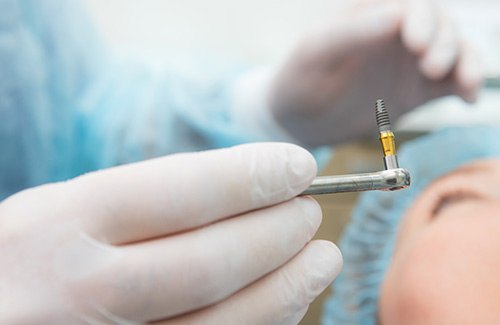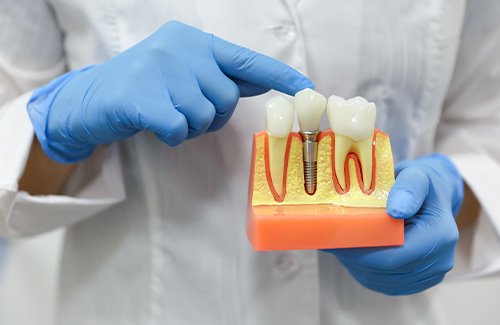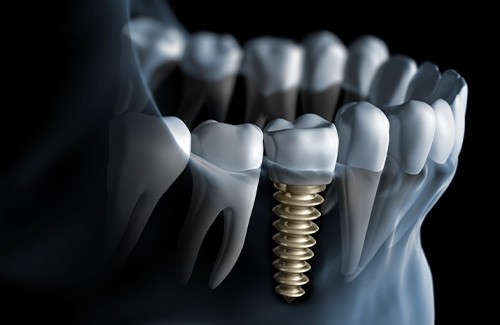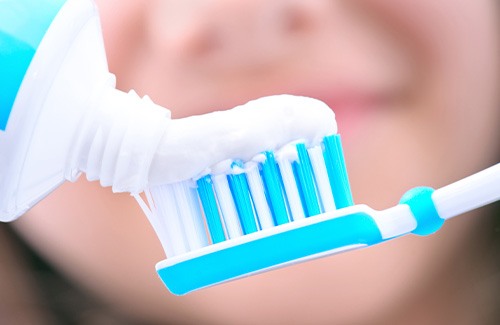Dental Implants – Orem, UT
A Sturdy, Long-Lasting Tooth Replacement Option

There is more than one way to replace missing teeth, but nowadays many dentists and patients favor dental implants – and with good reason. While traditional bridges and dentures still have their benefits, dental implants in Orem have many unique features that make them the next best thing to getting your natural teeth back. If you are interested in having dental implants placed and are wondering whether you are a good candidate for the treatment, you can give Frandsen Dental of Orem a call today to schedule a dental implant consultation.
Why Choose Frandsen Dental of Orem for Dental Implants?
- Dental Implants Placed In-Office
- Advanced Technology for Precise Placement
- Relaxing Sedation Options
What Are Dental Implants?

A dental implant is a small post that looks like a screw and is normally made out of titanium. We can place an appropriate number of implants in your jaw so that they can support a crown, bridge, or denture, thus replacing your missing teeth from the roots up. If they are well cared for, dental implants can be relied on to last for decades or even entire lifetimes.
The 4-Step Dental Implant Process

The process for getting dental implants can often be categorized into four crucial steps, each of which serves an important purpose. Here at Frandsen Dental of Orem, our team excels at placing dental implants and ensuring that your custom-made restoration looks and feels exactly as it should. With so much conscious effort going into your new smile, you’ll be glad you committed to this gold standard of tooth replacement! That said, here’s a brief look at the four main steps of the dental implant process.
Initial Dental Implant Consultation

Patients receiving dental implants begin their journey with a consultation. This appointment is crucial; it allows us to carefully examine your smile and the extent of your tooth loss so that we can determine whether dental implants are a suitable solution. This normally involves X-ray imaging too, for added thoroughness. Keep in mind that patients with inadequate jawbone density, which often occurs following tooth loss, might need to undergo a bone graft before they can safely receive implants. In other circumstances, patients with periodontal issues might need to undergo preliminary treatment to ensure their gum tissue is healthy enough to house the implants.
Dental Implant Surgery

After you’ve been cleared to receive dental implants, we can schedule the procedure. You’ll be happy to hear that here at Frandsen Dental of Orem, we’re capable of completing the entire dental implant process in-house. This means you won’t have to worry about coordinating with other offices and scheduling several different appointments – we’ll handle everything! As for the surgery itself, it’s surprisingly straightforward. We’ll access your jawbone through your gum tissue and carefully place the implant(s) in precise location(s). It takes roughly one hour to place a single dental implant.
Dental Implant Osseointegration & Abutment

Osseointegration is perhaps the single most important part of the entire dental implant process. It refers to the fusion between the implant post(s) and your jawbone. This process normally takes anywhere from 4 to 6 months, but the exact timeline can vary depending on numerous factors, including your compliance with your recovery guidelines. However, assuming things heal up correctly, you’ll be able to return for a smaller surgery to receive your abutments. These metal connector pieces are placed on top of your implants, and they allow us to secure your personalized dental restoration.
Delivery of Dental Implant Restoration(s)

Dental implants can replace any number of missing teeth, no matter where they’re located within a patient’s mouth. This means that your replacement teeth will be designed for you and you alone, and they’ll look, feel, and function as closely as possible to your original teeth. When it’s time, we’ll be able to attach this restoration to your abutments, and you’ll be able to immediately begin enjoying all the perks of having a complete and healthy smile!
Benefits of Dental Implants

Did you know that an estimated 500,000 dental implants are placed every year? These restorations continue to grow in popularity because they’re unique. After all, they’re the only artificial teeth embedded directly into your jaw. Because of this, they provide many advantages over alternatives like dentures or dental bridges.
Continue reading to learn more about the benefits of dental implants, and feel free to contact our office for more information.
Day-to-Day Benefits

Tooth loss can detract from your daily quality of life, impacting everything from your ability to converse clearly to sufficiently grinding your food. Thankfully, once your dental implants are placed, you can:
- Chew more easily. These artificial teeth give you back 70% to 90% of your natural chewing power, compared to dentures that restore about 10%.
- Enunciate sounds. Gaps in your grin can cause a lisp or other speech impediments that you can swiftly overcome once your prosthetic is in position.
- Feel confident. Worrying about how others might perceive the changes in your appearance and abilities can leave you feeling self-conscious. With a dental implant, you’ll be able to look and feel like your best self.
Health Benefits

It’s easy to see how dental implants can enhance your looks, but that’s not all they do. They also improve your dental and general health because they:
- Prevent bone loss. Your jawbone starts to thin after tooth loss because there’s no root to stimulate new bone growth when you bite down. The titanium rod of your restoration keeps your jaw active and strong.
- Block dental drifting. Your teeth might shift out of alignment to fill in the spaces left behind by those that went missing, which wears down your enamel prematurely. Dental implants ensure that they stay in their rightful positions.
- Are easy to clean. Brushing and flossing twice daily, along with a dental checkup every 6 months, is all you need to keep your prosthetics in good shape.
Long-Term Benefits

These artificial teeth are incredibly resilient and can potentially be with you for the remainder of your natural life. That means you can continue to enjoy the following long-term advantages for years to come:
- High success. This procedure has a staggeringly high 95% success rate, even up to 10 years after the initial surgery.
- Durability. The titanium and ceramic materials used to create your implant are intended to withstand the tests of time.
- Save expenditures. Because they’re stronger and more reliable than dentures or dental bridges, you’re less likely to need to pay for costly repairs or replacements down the road.
Understanding the Cost of Dental Implants

Dental implants have a wide range of unique benefits that you can’t find with other tooth replacement options. However, they also have a higher upfront cost. Everyone’s case is a little bit different, so the cost of dental implants can vary. During your consultation, we will go over the estimated cost of your treatment in detail so that you don’t run into any surprises. Until then, here are some things to take into consideration.
Preliminary Treatments & Dental Implant Surgery

In some cases, patients need to undergo preliminary treatments before they are able to get dental implants. This can include things like gum disease treatment, tooth extractions, bone grafting, and other services. You should consider the costs of these procedures if they apply to you. Fortunately, the cost of preliminary procedures is often partially covered by dental insurance. Just remember that every plan is different, so it’s best to contact your provider ahead of time to confirm your coverage with them.
The Parts of Your Dental Implant

There are multiple factors that play a role in the cost of your dental treatment. Here are the main ones that are considered:
- Number of Implants: The number of teeth that you are missing and where they are located in the mouth will determine the number of dental implants that you require. The more dental implants you are receiving, the higher the cost.
- Type of Restoration: Dental crowns, bridges, and dentures are all at different price points. In most cases, the smaller the restoration, the lower the cost.
- Materials Used: Dental implants are usually made from surgical titanium. However, they can also be made from zirconia in some circumstances.
- Brand of Implant: Just like any other product, dental implants come from a variety of manufacturers. This influences the cost.
How Dental Implants Can Save You Money

It may be tempting to try to save money on your replacement teeth by choosing another option, like dentures. Traditional dentures are effective at replacing teeth, and they are an excellent option for some, but they do not provide the same advantages as dental implants. In the long run, you could actually save money by getting dental implants. With implants, you don’t need to worry about putting up money for frequent repairs or replacements every few years. You also don’t need to buy adhesives or soaking solutions. Since dental implants help to prevent serious oral health issues, you may be able to avoid costly restorative treatments later in life.
Does My Dental Insurance Cover Dental Implants?

Most of the time, dental insurance doesn’t cover the cost of dental implants. However, there are some exceptions to keep in mind. Parts of the final restoration and preliminary procedure are usually covered. However, dental insurance plans vary, so you should confirm this with your provider ahead of time. We’d also be happy to help you in this process. At Frandsen Dental of Orem, we are in-network with Delta Dental, BlueCross BlueShield, Dentist Direct, MetLife, and more. We can also work with out-of-network providers and do our best to maximize your benefits.
Making Dental Implants Affordable

If you don’t have dental insurance, this doesn’t mean that you are out of luck. With our in-house membership plan, you can save on many of the services at our practice. We are also happy to accept payment through CareCredit – a third-party financing company that can split the cost of your treatment into manageable monthly installments with little to no interest. For more information, don’t hesitate to contact one of our friendly team members.
Dental Implant Post-Op Instructions

Recovering from dental implant surgery requires some time and attention to ensure proper healing. While your gums will begin to recover within a few days, complete healing typically takes one to two weeks. However, the process of osseointegration (where the implant fuses with the jawbone) can take several months. At Frandsen Dental of Orem, we’re committed to helping you achieve a smooth and speedy recovery. Below, we’ve outlined some key post-op instructions.
What to Do Directly After Dental Implant Surgery

Rest is crucial during the first 24 hours after your procedure. To promote healing and protect the forming blood clot, avoid:
- Spitting. Use tissues or swallow saliva instead.
- Drinking through straws. This creates suction that can disrupt the clot.
- Smoking or using tobacco. These can hinder healing.
- Touching the surgical site. Keep your tongue and fingers away to prevent irritation.
Common Side-Effects When Recovering from Dental Implant Placement

If this is your first oral surgery, you might wonder what side effects to expect. During the initial recovery period, the following are normal:
- Intermittent Bleeding – This may continue for a few days. Apply gentle pressure with gauze to control it.
- Swelling – Swelling can last for over a week. Use an ice pack or cold compress for ten-minute intervals to reduce it.
- Discomfort – Pain can be managed with prescribed or over-the-counter medications.
These symptoms should gradually improve. If they persist or worsen, contact our office for further assistance.
Your Diet After Dental Implant Surgery

For the first few days, stick to soft foods to avoid straining the surgical area. Consider stocking up on items like:
- Mashed potatoes
- Yogurt
- Ice cream
- Pudding
- Pasta
- Soup (ensure it’s warm, not hot)
As you heal, you can slowly reintroduce regular foods. However, continue to be cautious to avoid damaging your new implants.
Post-Op Health & Oral Hygiene

Keeping your mouth clean is essential for proper healing. Here are some tips:
- Brush your teeth carefully, avoiding the surgical site
- Rinse with warm salt water two to three times daily to control bacteria
- Avoid alcohol-based mouthwashes, as they can irritate the area and increase the risk of complications like dry socket
What to Do After Your New Teeth Are Attached

Once healing is complete, the final stage involves attaching your crown, bridge, or denture. This step typically involves minimal recovery. You may experience mild gum sensitivity, which can be alleviated with pain medication. After this, your new smile is ready to be shown off!
Maintaining & Caring for Your Dental Implants

We have good news: maintaining and caring for your dental implants doesn’t require any special oral hygiene tools or complicated oral care regimens. In fact, you can keep them in pristine condition with many of the best practices you have in place already. If you want to learn more on the topic, you’re more than welcome to read on or contact our Orem dental team too!
Make Oral Hygiene a Priority

Whether you only have one dental implant or you don’t have any of your natural teeth left, oral hygiene needs to be a priority. If it isn’t, then it’s only a matter of time until your dental implants fail from peri-implantitis (a form of gum disease). We recommend starting with the basics, like brushing your teeth for a full two minutes each morning and evening. Then, make sure that you floss and rinse with mouthwash consistently so the spaces between your teeth and your dental implants are thoroughly cleaned too.
Eat a Healthy Diet

Remember, hard pretzels, popcorn, thin-crust pizza, and other crunchy foods can cause your restoration to chip or crack. Plus, sugary and starchy foods can lead to tooth decay and gum disease if you aren’t careful. Put simply: what you eat impacts the condition of your teeth, your gums, and your dental implants. So, do your best to eat mostly softer, more nutrient-dense foods, like plain yogurt, vegetable soup, oatmeal, and bananas.
Break Bad Habits

If you haven’t already, it’s important that you put a plan in place to break bad dental habits. A few examples include smoking, biting your nails, chewing on ice cubes, or using your teeth to remove bottle caps. If you don’t, then it won’t be long until your dental implants break under the pressure, requiring an emergency visit to our Orem dental office to have them repaired or replaced.
Protect Your Dental Implants

Do you experience jaw pain and headaches when you wake up? If you answered “yes,” then you may have Bruxism (which is where you grind or clench your teeth at night). It might seem harmless initially, but it can negatively impact the look and function of your dental implants. For this reason, we recommend scheduling an appointment with us sooner rather than later; we want to get a custom nightguard made for you ASAP.
Schedule Regular Dental Checkups

The final step is one that many patients are surprised by. After all, if dental implants are artificial and, therefore, cannot decay, why do you need to visit the dentist every six months? The short answer is that we need to periodically check for oral cancer, gum disease, and the like. We also need to remove plaque and tartar before it has the chance to wreak havoc on your oral health. So, make these biannual visits a priority, even if you don’t have any of your natural teeth left!
Dental Implant FAQs
How Long Do Dental Implants Last?
Dental implants might be right for you if you’re seeking resilient stand-alone replacement teeth. They’re known to last 30+ years, which might potentially be the remainder of your natural life. However, their longevity greatly depends on how well you care for them. For example, brushing and floss twice daily to remove plaque and bacteria that contribute to tooth decay and gum disease is essential. Also, avoid overly hard or sticky foods that might chip or injure your restoration.
Finally, it’s a good idea to visit our Frandsen Dental of Orem team every six months for a routine checkup and cleaning so we can ensure your teeth and prosthetics are all in good shape.
Does Getting Dental Implants Hurt?
Many patients who have dental anxiety avoid this procedure because they’re worried it will be overly long or agonizing. Thankfully, that’s usually not the case! First, our team will numb the area with a local anesthetic so you don’t feel any pain. On top of that, you’re likely to be sedated so to induce sensations of calm and relaxation the entire time. That means you likely won’t feel any discomfort until after your appointment when the meds wear off.
Then, it’s normal to have some aches and inflammation. Fortunately, these symptoms typically peak after three days and begin to subside gradually. It’s usually safe to take over-the-counter painkillers like Tylenol or ibuprofen or apply a cold compress to that side of your face for a temporary reprieve.
What Can Cause Dental Implants to Fail?
Typically, dental implants have an incredibly high success rate of more than 95% when they’re placed by a licensed professional. They’re also known for their strength and stability, but that doesn’t mean they’re invincible. Although it’s uncommon, your artificial teeth might fail if:
- You skip cleanings. Poor at-home oral hygiene can lead to a form of gum disease, peri-implantitis, that can spread to your jawbone and weaken the foundational support required to maintain healthy implants.
- It doesn’t integrate properly. The titanium rod of your prosthetic typically fuses with your jawbone in a process called osseointegration. If your jaw is too weak or your body doesn’t generate enough new bone growth, this process might not be completed successfully.
- You use tobacco products. Cigarettes, vapes, and chewing tobacco all contain nicotine, which restricts your blood oxygen levels and flow. This hinders your mouth’s ability to receive the nutrients it needs to fight infection or recover effectively after surgery.
Is There Anything I Shouldn’t Eat with Dental Implants?
Because of their unique placement in your jaw, dental implants don’t come with as many dietary restrictions as alternatives like dentures and dental bridges. As a result, you can enjoy a wide range of health ingredients to support total-body health. However, some foods might harm your restoration if you’re not careful.
Steer clear of overly hard foods like nuts, ice, or candy that might chip the crown, and avoid sticky or chewy choices that might loosen or dislodge the metal rod embedded in your jaw.
